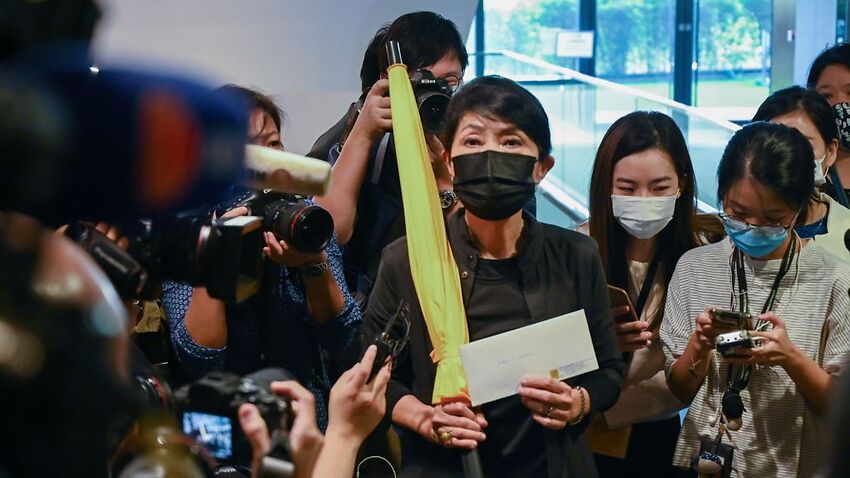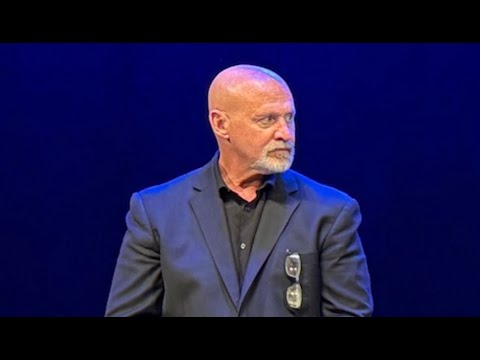Human rights groups and experts have raised concerns over Hong Kong’s lack of pro-democracy politicians in office, after 15 opposition members resigned to protest the dismissal of four of their colleagues.
Four politicians were removed by Hong Kong’s government under a resolution from Beijing that effectively allows city authorities to dismiss any politician considered a threat to national security.
The remaining 15 opposition members of the 70-seat Legislative Council, known as LegCo, followed them in protest, staging a final show of defiance in the legislature on Thursday (local time) before resigning.
“I suppose this is my last protest in LegCo,” opposition member Lam Cheuk-ting said after unfurling a protest banner vilifying the city’s pro-Beijing leader, Carrie Lam.
Here’s what it means and what happens next.
What has happened?
On Wednesday, China passed a resolution allowing Hong Kong’s government to remove any elected politician who is considered a supporter of Hong Kong independence, or who has refused to acknowledge China’s sovereignty over Hong Kong; sought assistance from foreign forces to interfere in the city’s affairs; or has committed other acts that threaten national security.
The resolution allows the government to remove any elected lawmaker without having to go through the courts.
Shortly after the resolution was passed, four pro-democracy politicians were removed from office – Alvin Yeung, Kwok Ka-ki and Dennis Kwok of the Civic Party and Kenneth Leung of the Professionals Guild.
It has been noted that all four are considered moderates and have never supported the independence of Hong Kong.
Before this even happened, the group had been banned from running for re-election.
On Wednesday, Ms Lam defended the expulsions as being in accordance with the law, saying they were “constitutional, legal, reasonable and necessary”.
Why did the others resign?
Fifteen other pro-democracy lawmakers then followed, quitting in solidarity with their colleagues who had been sacked.
Opposition politician Claudia Mo said the resolution had made their work difficult.
“They would think that from now on, anyone they found to be politically incorrect or unpatriotic… they could just oust you,” she said.
Justin Hastings, a professor in International Relations at the University of Sydney, said the way the resolution was being interpreted and implemented gave the pro-democracy politicians no choice but to resign.
“They can’t really ask questions of the government anymore and demand weekly data or answers from them on behalf of their constituents (without raising suspicion),” he told SBS News.
Mr Hastings said the more power that was removed from the semi-democratic legislative council, the less the presence of the opposition mattered.
“They may have concluded, ‘why engage in a farce anymore?’,” he said.
“Did they give China what they wanted? Yes – but China could just as easily have done that themselves.”
What does it mean?
Hong Kong’s legislature will no longer have any dissenting voices for the first time since 1997, when Britain handed back Hong Kong to China.
This means the chamber will be carried by Chinese loyalists.
“LegCo is basically no longer legitimate,” Mr Hastings said, adding pro-democracy Hong Kong residents no longer have a voice in the legislature.
“In terms of the Hong Kong people having a voice such that they can ask questions of the government and demand to have them answered … that has been removed from them,” he said.
Hong Kong’s pro-democracy legislators resign
Maya Wang, a senior China researcher from Human Rights Watch, said it’s the end of an era for Hong Kong.
“LegCo will have no opposition and very unpopular policies will have very little scrutiny,” she told SBS News.
Ms Wang said while LegCo was always meant to be a weak body and lack legislative power, it had been a key platform to give a voice to pro-democracy supporters.
She said the resolution was effectively a “screening” system that would allow the removal of anyone considered a national security threat under “vague criteria”, or anyone that the government simply didn’t like.
The end of ‘one country two systems’?
Mr Hastings said the developments far from signal the end of the ‘one country two systems’ framework – in place since 1997 – which he claims already happened when the national security law came into effect.
“This is just kicking the carcass at this point,” he said.
“It’s sort of formalising what has already happened in terms of the implementation of the national security law.”
Ms Wang said the latest developments will have a dramatic impact on Hong Kong.
“Anger and fear probably does define quite a lot of how people feel – fear in the sense of not knowing where this stops,” she said.
“Hong Kong people have never experienced this kind of repression that mainland Chinese people have to deal with.
“People have to really recalibrate in many ways how they live and talk.”
How is the world responding?
Australia issued a statement saying the disqualification of the elected lawmakers “seriously undermined” Hong Kong’s democratic processes and institutions.
Foreign Minister Marise Payne said the Legislative Council remained a key pillar of the rule of law and the “one country two systems” framework.
“This is critical to maintaining international confidence in Hong Kong,” she added.
The Trump administration was stronger in its condemnation, warning it would impose further sanctions on top of those already in place, including on the four officials tied to the national security law.
US National Security Advisor Robert O’Brien said the Chinese Communist Party had “flagrantly violated” its international commitments.
“‘One Country, Two Systems’ is now merely a fig leaf covering for the CCP’s expanding one party dictatorship in Hong Kong,” he said.
UK Foreign Secretary Dominic Raab said the Chinese resolution was “a further assault on Hong Kong’s high degree of autonomy and freedoms under the UK-China Joint Declaration”.








